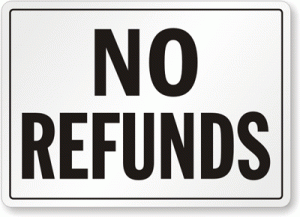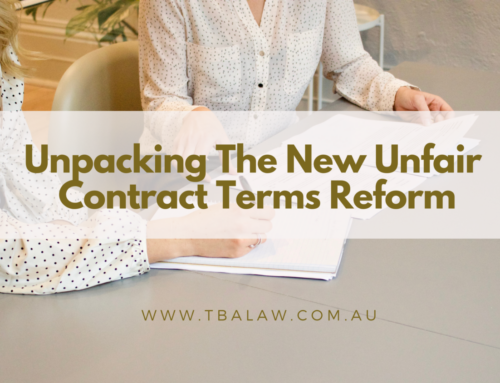Are “No Refund” Signs Legal?
In recent articles I have written about Consumer Guarantees under the Australian Consumer Law (“the ACLâ€). If you have not already read these articles, I encourage you to do so, especially if you are interested in what Consumer Guarantees are and when they apply.
In this article I discuss “No Refund†signs in circumstances where the Consumer Guarantees apply. I will begin by stating that “No Refund†signs in such circumstances have no legal effect. Moreover, they are unlawful.
 In fact, any sign, statement, or agreement that limits or attempts to limit, restrict or exclude consumers’ rights under the ACL is unlawful. A “No Refund†sign is an attempt to ‘contract out of’ the Consumer Guarantees. By displaying such a sign, a business is informing the consumer that one of the terms of the sale is that the consumer cannot get a refund after the sale. Because “No Refund†is a blanket statement, it implies that no refund will be given under any circumstances. The statement is therefore unlawful because, as has been discussed in previous articles, consumers have the right to be refunded in a range of circumstances, such as where a product has a major fault.
In fact, any sign, statement, or agreement that limits or attempts to limit, restrict or exclude consumers’ rights under the ACL is unlawful. A “No Refund†sign is an attempt to ‘contract out of’ the Consumer Guarantees. By displaying such a sign, a business is informing the consumer that one of the terms of the sale is that the consumer cannot get a refund after the sale. Because “No Refund†is a blanket statement, it implies that no refund will be given under any circumstances. The statement is therefore unlawful because, as has been discussed in previous articles, consumers have the right to be refunded in a range of circumstances, such as where a product has a major fault.
It should be pointed out, however, that there is no problem with a business displaying signs that do not attempt to restrict the Consumer Guarantees. For instance a sign stating “No Refunds if you simply change your mind†is perfectly lawful.
Whenever the Consumer Guarantees apply, businesses need to be aware that they cannot tell a consumer that the Guarantees do not exist. They also cannot ask their customers to pay an extra amount for any of the Guarantees. This second point potentially raises issues for businesses that offer warranties (especially extended warranties) on their goods and services in exchange for an additional payment. Such warranties will need to clearly state exactly what they offer in addition to the Consumer Guarantees. If they fail to do so, a consumer could lawfully obtain a refund for part or all of the cost of the warranty. Where a large number of such warranties has been sold by a business, a business could be exposed to significant financial risk (even a ‘class action’).
In addition to this refund risk, the provision of false or misleading information also carries potential civil and even criminal penalties. For corporations, the penalty can be up to $1.1 million. For individuals it is up to $220,000.
If you have any questions about the lawfulness of a sign, statement, agreement or warranty, contact Theobald Lawyers and we will answer them.
Written by Matthew Elvin
Contact us to arrange a chat with one of our legal professionals. It doesn’t hurt to ask.
NOW ALSO AVAILABLE BY APPOINTMENT IN MELBOURNE




